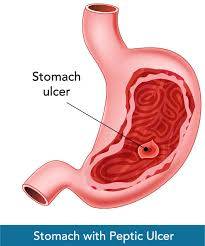A stomach ulcer, also known as a peptic ulcer, is a painful sore that develops on the lining of the stomach or small intestine. It is usually caused by an imbalance between stomach acid and the protective mucus lining that shields the stomach walls from the corrosive effects of the acid. This imbalance can be triggered by factors such as stress, smoking, alcohol consumption, certain medications, and bacterial infections, particularly Helicobacter pylori (H. pylori).
Stomach ulcers can cause a range of symptoms, including abdominal pain, bloating, heartburn, nausea, vomiting, and weight loss. If left untreated, they can lead to serious complications such as bleeding, perforation of the stomach lining, and an increased risk of developing stomach cancer. Therefore, it is crucial to seek medical attention if you suspect that you have a stomach ulcer.
Fortunately, there are several effective treatments available for stomach ulcers, which can help alleviate symptoms, promote healing, and prevent the recurrence of ulcers. In this essay, we will discuss some of the common ways to cure stomach ulcers.
One of the primary treatments for stomach ulcers is medication. Proton pump inhibitors (PPIs) are commonly prescribed to reduce the production of stomach acid and allow the ulcer to heal. PPIs work by blocking the enzyme that produces acid in the stomach, thereby helping to reduce inflammation and promote healing of the ulcer. Examples of PPIs include omeprazole, lansoprazole, and esomeprazole.
Antibiotics are also frequently prescribed to treat stomach ulcers caused by H. pylori infection. These antibiotics help to kill the bacteria, allowing the ulcer to heal and reducing the risk of recurrence. In some cases, a combination of antibiotics and PPIs may be prescribed to effectively eradicate the infection and promote healing of the ulcer.
Another common medication used to treat stomach ulcers is H2-receptor antagonists, such as ranitidine and famotidine. These medications work by reducing the production of stomach acid and can help to alleviate symptoms and promote healing of the ulcer.
In addition to medication, lifestyle changes can also play a crucial role in curing stomach ulcers. Maintaining a healthy diet that is rich in fruits, vegetables, whole grains, and lean proteins can help to support the healing process and reduce inflammation in the stomach. Avoiding spicy, fatty, and acidic foods can also help to alleviate symptoms and prevent irritation of the stomach lining.
Smoking and alcohol consumption are known to aggravate stomach ulcers and delay healing, so it is essential to quit smoking and limit alcohol intake to promote the healing of the ulcer. Managing stress through relaxation techniques such as meditation, yoga, or deep breathing exercises can also help to reduce the production of stomach acid and promote healing of the ulcer.
In some cases, surgery may be required to treat stomach ulcers that do not respond to medication or lifestyle changes. Surgery may involve removing the ulcer or repairing a perforation in the stomach lining. However, surgery is typically considered a last resort and is only recommended if other treatments have been unsuccessful.
In conclusion, stomach ulcers can be painful and debilitating, but with the right treatment and lifestyle changes, they can be effectively cured. Medications such as PPIs, antibiotics, and H2-receptor antagonists can help to reduce stomach acid production and promote healing of the ulcer. Lifestyle changes such as maintaining a healthy diet, quitting smoking, reducing alcohol intake, and managing stress can also play a crucial role in curing stomach ulcers. If you suspect that you have a stomach ulcer, it is essential to seek medical attention to receive the appropriate treatment and prevent complications. By following your doctor's recommendations and making positive changes to your lifestyle, you can effectively cure your stomach ulcer and enjoy a healthier, happier life.



No comments yet
Be the first to share your thoughts!